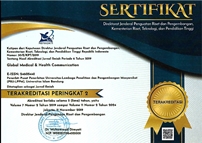Stigma and Discrimination of People with HIV/AIDS by Health Officers in Bulukumba Regency
Abstract
Stigma and discrimination against people with human immunodeficiency virus/acquired immune deficiency syndrome (HIV/AIDS) are among the biggest obstacles to preventing and overcoming (HIV/AIDS) in Indonesia. This study aims to analyze the factors related to stigma and discrimination and determine the types of stigma and discrimination given by health workers to people with HIV/AIDS. The population in this study were health workers in 20 health centers in Bulukumba, consisting of nurses, midwives, health analysts, doctors, and public health. The sampling technique used a total sampling of 322 health workers, and data was collected online through Google Forms on 15–26 February 2021 and analyzed univariately and bivariate using the chi-square and linear association tests. The results showed that type of profession (p=0.041) and knowledge (p=0.019) were factors related to stigma and discrimination. The most considerable stigma experienced by people with HIV/AIDS was feeling disgusted and uncomfortable being around people with HIV/AIDS, and the notion that HIV/AIDS disease suffered was only the result of free sex. At the same time, discrimination was a form of the biggest problem was the behavior of health workers who will use layered handsome when performing/providing services to people with HIV/AIDS.
Keywords
Full Text:
PDFReferences
Widyaningtyas PA. Implementasi kebijakan pengendalian penularan HIV/AIDS melalui hubungan seksual. Ikesma. 2019;15(1):24–30.
Joint United Nations Programme on HIV and AIDS (UNAIDS). People living with HIV stigma index: Asia Pacific Regional Analysis 2011 [Internet]. Geneva: UNAIDS; 2011 August 29 [cited 2020 December 20]. Available from: https://www.unaids.org/sites/default/files/media_asset/20110829_PLHIVStigmaIndex_en_0.pdf.
Nyblade L, Reddy A, Mbote D, Kraemer J, Stockton M, Kemunto C, et al. The relationship between health worker stigma and uptake of HIV counseling and testing and utilization of non-HIV health services: the experience of male and female sex workers in Kenya. AIDS Care. 2017;29(11):1364–72.
Geter A, Herron AR, Sutton MY. HIV-related stigma by healthcare providers in the United States: a systematic review. AIDS Patient Care STDS. 2018;32(10):418–24.
Hubert M, Bajos N, Sandfort T. Sexual behaviour and HIV/AIDS in Europe: comparisons of national surveys. New York: Routledge; 2022.
McGrath N, Eaton JW, Newell ML, Hosegood V. Migration, sexual behaviour, and HIV risk: a general population cohort in rural South Africa. Lancet HIV. 2015;2(6):e252–9.
da Costa TL, de Oliveira DC, Formozo GA. Quality of life and AIDS from the perspective of persons living with HIV: a preliminary contribution by the structural approach to social representations. Cad Saude Publica. 2015;31(2):365–76.
Fatoki B. Understanding the causes and effects of stigma and discrimination in the lives of HIV people living with HIV/AIDS: qualitative study. J AIDS Clin Res. 2016;7(12):1000635.
Mhode M, Nyamhanga T. Experiences and impact of stigma and discrimination among people on antiretroviral therapy in Dar es Salaam: a qualitative perspective. AIDS Res Treat. 2016;2016:7925052.
Stangl AL, Lloyd JK, Brady LM, Holland CE, Baral S. A systematic review of interventions to reduce HIV-related stigma and discrimination from 2002 to 2013: how far have we come? J Int AIDS Soc. 2013;16(3 Suppl 2):18734.
Farotimi AA, Nwozichi CU, Ojediran TD. Knowledge, attitude, and practice of HIV/AIDS-related stigma and discrimination reduction among nursing students in southwest Nigeria. Iran J Nurs Midwifery Res. 2015;20(6):705–11.
Fauk NK, Hawke K, Mwanri L, Ward PR. Stigma and discrimination towards people living with hiv in the context of families, communities, and healthcare settings: a qualitative study in indonesia. Int J Environ Res Public Health. 2021;18(10):5424.
Lee HJ, Kim DH, Na YJ, Kwon MR, Yoon HJ, Lee WJ, et al. Factors associated with HIV/AIDS-related stigma and discrimination by medical professionals in Korea: a survey of infectious disease specialists in Korea. Niger J Clin Pract. 2019;22(5):675–81.
Mahendra VS, Gilborn L, George B, Samson L, Mudoi R, Jadav S, et al. Reducing AIDS-related stigma and discrimination in Indian hospitals [Internet]. New York: Population Council; 2006 [cited 2020 December 26]. Available from: https://knowledgecommons.popcouncil.org/departments_sbsr-hiv/51.
Feyissa GT, Lockwood C, Woldie M, Munn Z. Reducing HIV-related stigma and discrimination in healthcare settings: a systematic review of quantitative evidence. PLoS One. 2019;14(1):e0211298.
Waluyo A, Nova PA, Edison C. Perilaku perawat terhadap orang dengan HIV/AIDS di rumah sakit dan puskesmas. JKI. 2011;14(2):127–32.
Berek PAL, Bubu W. Hubungan antara umur, jenis kelamin, pendidikan dan pekerjaan dengan stigmatisasi terhadap orang dengan HIV/AIDS di RSUD Mgr. Gabrielmanek, SVD Atambua. JSK. 2019;1(2):36–43.
Ishimaru T, Wada K, Arphorn S, Smith DR. Attitudes of nurses toward HIV-infected colleagues in Japan. Contemp Nurse. 2017;53(2):133–42.
Darmoris, Shaluhiyah Z, Mustofa SB. Diskriminasi petugas kesehatan terhadap orang dengan HIV-AIDS di Provinsi Kepulauan Bangka Belitung. JPKI. 2011;6(2):101–8.
Guma JA. Health workers stigmatise HIV and AIDS patients. SSMJ. 2011;4(4):92–3.
Wagner AC, Hart TA, McShane KE, Margolese S, Girard TA. Health care provider attitudes and beliefs about people living with HIV: initial validation of the Health Care Provider HIV/AIDS Stigma Scale (HPASS). AIDS Behav. 2014;18(12):2397–408.
Herek GM, Capitanio JP, Widaman KF. HIV-related stigma and knowledge in the United States: prevalence and trends, 1991–1999. Am J Public Health. 2002;92(3):371–7.
Suswani A, Arsin AA, Amiruddin R, Syafar M, Palutturi S. Factors related quality of life among people living with HIV and AIDS in Bulukumba. IJCMPH. 2018;5(8):3227–31.
Sohn A, Park S. HIV/AIDS knowledge, stigmatizing attitudes, and related behaviors and factors that affect stigmatizing attitudes against HIV/AIDS among Korean adolescents. Osong Public Health Res Perspect. 2012;3(1):24–30.
DOI: https://doi.org/10.29313/gmhc.v11i1.9722
pISSN 2301-9123 | eISSN 2460-5441
Visitor since 19 October 2016:
Global Medical and Health Communication is licensed under a Creative Commons Attribution-NonCommercial-ShareAlike 4.0 International License.






























.png)
_(1).png)
_(1).jpg)
